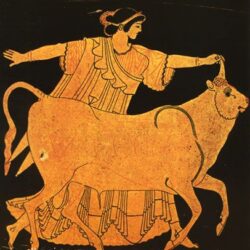The narrator of Woolf’s A Room of One’s Own is deeply introspective and reflective as she attempts to write “Women and Fiction” and navigate British society. There are several intersecting factors at play that contribute to her inner conflict, ranging from finances to general ostracism to the unstable nature of domesticity. One quote in particular from the first chapter really resonated with what I thought was a rather crucial theme of exclusion: “and I thought how unpleasant it is to be locked out; and I thought how it is worse perhaps to be locked in” (Woolf 17). How does this quotation transcend the narrative? How does it speak to the systemic economic hardship faced by women that the narrator ponders in great depth?
Moreover, what is the relationship between women and fiction on a more “meta” level–why does Woolf articulate these thoughts through fiction rather than nonfiction or a personal essay? What do you make of her struggle at the end of chapter two to rectify this tension between freedom and protection, and what “bearing” it has on her paper? (Woolf 29).
